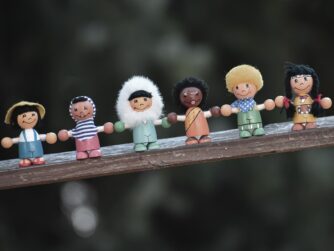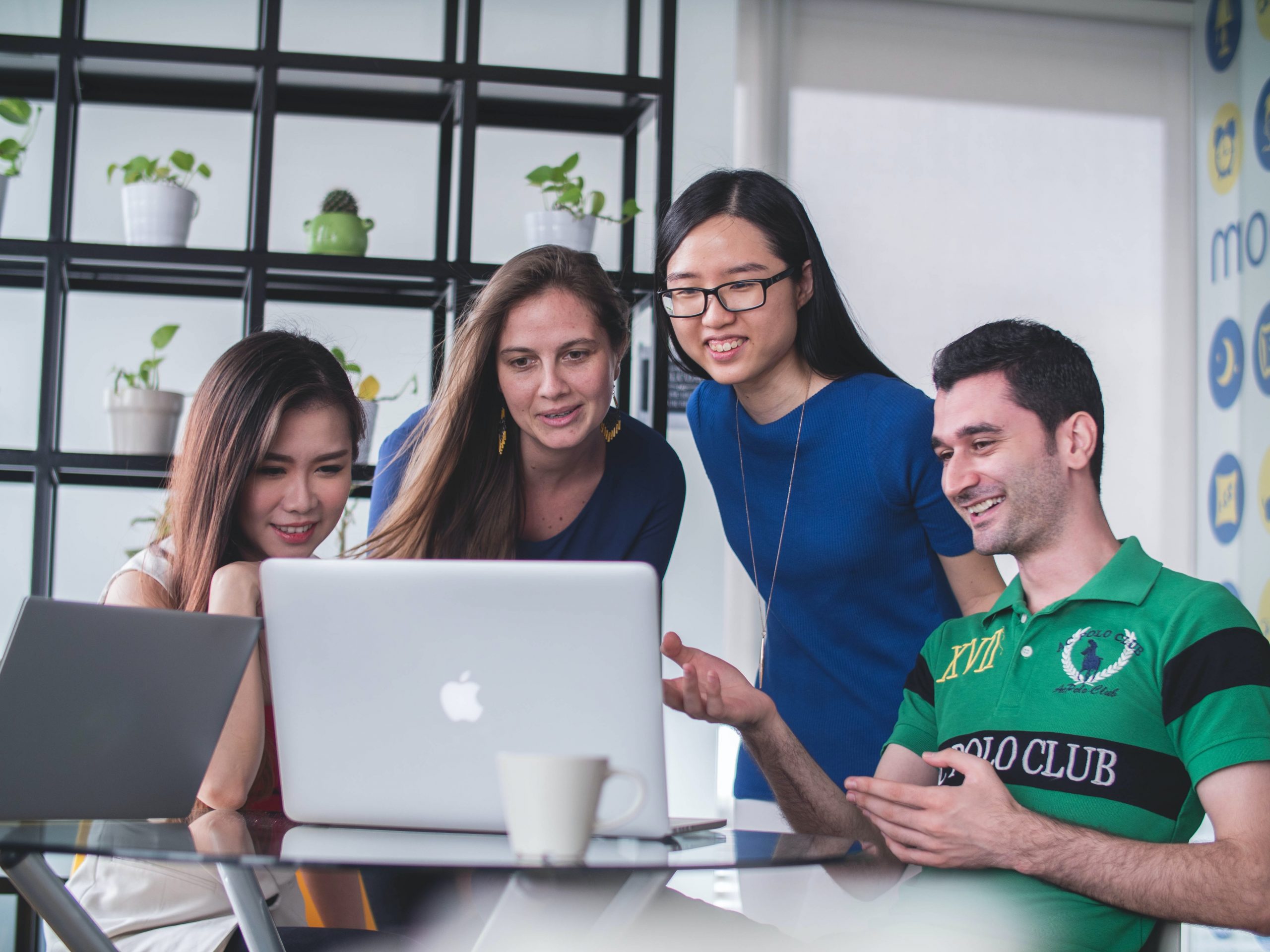Voice 1
Welcome to Spotlight. I’m Roger Basick.
Voice 2
And I’m Liz Waid. Spotlight uses a special English method of broadcasting. It is easier for people to understand no matter where in the world they live.
Click here to follow along with this program on YouTube.
Voice 3
Fighting hate begins with me. I can change my attitudes. I have courage. I know what is right. I can fight hate. It begins with me. With me.
Voice 1
Today’s Spotlight program is the last in a series of 10 programs. In this series of programs, we have looked at 10 ways to fight hate in your community.
Voice 2
Hate is powerful enough to destroy people and communities. So, the Southern Poverty Law Center in the United States has made this list of 10 ways to fight hate. On today’s Spotlight we will look at the 10th way to fight hate in your community: Dig Deeper.
Voice 1
Have you ever examined your own opinions and beliefs? No one wants to have hateful feelings toward other people. No one wants to judge people who are different. No one wants to have bad thoughts about particular races, religions, or nationalities. But we all do. We may not even know the feelings are there. But no one is perfect. We all have prejudices. These opinions and beliefs influence our actions and thoughts.
Voice 2
The Southern Poverty Law Center, or the SPLC, wants all people to dig deep inside their hearts. They want people to find the harmful feelings inside themselves and then change them. The SPLC believes that each person must decide for himself if he will be tolerant or not. Tolerance means that every voice matters. It means that all people are valuable no matter who they are or what they believe. Every person can learn, accept, and practice tolerance.
Voice 1
The SPLC lists “Dig Deeper” as the 10th way to fight hate. But they really believe that it is the first step a person must take to be more tolerant of other people.
Voice 2
So, what are some ways for people to dig deeper and change their harmful thoughts? The SPLC says that a good way to discover harmful feelings is to ask questions … of yourself! They want people to look hard at their lives and their experiences to answer these questions. Here are some examples of questions we all should ask ourselves about what we think and feel.
Voice 1
Do I spend time with people of other races and religions? Do I have friends who are different from me?
Voice 2
Do I live near people who are different than me? Do I work with people who are different? Do my children go to school with people who are different?
Voice 1
Do my friends and family tell hate-based jokes or laugh at people who are different from them? How do I react to their jokes? Do I have the courage to tell them to stop?
Voice 2
Where do I get information about other cultures? Do I read about other cultures from books or magazines? Do I get information from real people of that culture? Or do I depend on films and television programs by others to tell me about other cultures?
Voice 1
Do I take time to learn from other people’s experiences? Do I listen to people who have different opinions from me? Am I willing to hear all people’s stories and opinions?
Voice 2
How often do I feel like a minority in a group of people? Do I know how it feels to live in a place where no one is like me?
Voice 1
These are sometimes difficult questions. But these kinds of questions help people dig deeper into their own thoughts and feelings. People may discover harmful feelings that they did not know about. And they can work to change them.
Voice 2
One person who decided to dig deeper was Derek Black. Black grew up in Alabama, in the southern United States. His father had been a leader in the KKK. This hate group believed that white people are better than any other groups of people. The KKK often used violence to spread their message. They targeted black people, immigrants, people of different faiths, and others.
Voice 1
Black’s parents and community taught him that the United States was only for white people. They taught him to suspect the worst of other races. They taught him not to believe the government or news sources. His parents even took him out of school. At home, they could teach him their beliefs. Derek Black believed in the message of the KKK. He even spread that message on his own radio program.
Voice 2
As a young man, Black went to college. There, he hoped to learn how to enter politics. He believed this was the best way to bring the KKK’s beliefs to more people. But that is not what happened.
Voice 1
For a few years, Black spread the message of the KKK. He continued his radio program. But the students at Black’s college discovered Black’s beliefs. They wanted to change his mind. One night, another student, Matthew, invited Black to his house for a dinner with other students. Matthew was a Jew. Black had said terrible things about Jews before. But Black decided to go.
Voice 2
At the dinner, Matthew asked the other students not to talk about Black’s beliefs. He wanted Black to get to know them. Over the next months, Matthew continued inviting Black to these group dinners. Black began to get to know the students from different places. He learned more about them as people.
Voice 1
He got to know this group of people who were different from him. He had conversations with them. And after a time, Black’s ideas began to change. He did not change his views immediately. But after a few years, he knew that his beliefs were not good.
Voice 2
Finally, Black left the KKK. He no longer believes that any group of people is better than others. He sees the value in diversity – gathering people from all different places. Black regrets his past actions and words. He knows that his beliefs affected people. He told the Washington Post,
Voice 3
“It is not just that I was wrong. It is that I caused real damage.”
Voice 1
He does have hope for people who are like he was. But it does take work. He told PBS News Hour,
Voice 3
“I think you can see hope in every individual person who comes to a new understanding about things or changes. And so that is always my advice to other people who wonder what we could do. My advice is to just start with one person that you have a connection with. And that is the most important and powerful thing you can possibly do.”
Voice 2
There are many problems in communities all around the world. These are problems like sickness, poor quality housing, hunger, and violence. But these kinds of problems can be solved if people with different ideas work together. When a community decides to first deal with hate, many good things can follow. It is a long and difficult process to fight hateful thoughts and actions. But there is a very important question for each person: why not start today? The most important step is the first one.
Voice 1
Will you make that first step? What steps can you make to examine your own thoughts and feelings? What steps can you take toward fighting hate today?
Voice 2
This is the last program in a series of 10 programs on 10 ways to fight hate. This list is from the Southern Poverty Law Center. The Southern Poverty Law Center is a group that works toward racial justice. They monitor hate crimes, teach tolerance, and seek justice. Here are their 10 ways to fight hate:
Act, Join Forces, Support the Victims, Speak Up, Educate Yourself, Create an Alternative, Pressure Leaders, Stay Engaged, Teach Acceptance, Dig Deeper.
Voice 1
Did you miss a program from this series? You can find the complete series “Ten Ways to Fight Hate” on our website and on our YouTube channel. If you have stories about people working to fight hate in your community, please tell us about them. You can leave a comment on our website at www.spotlightenglish.com. You can also find us on YouTube, Facebook, Instagram, and Twitter.
Voice 2
The writers of this program were Sara DeKoster and Liz Waid. The producer was Michio Ozaki. All quotes were adapted for this program and voiced by Spotlight. This program is called “Ten Ways to Fight Hate: Dig Deeper.”
Voice 1
Visit our website to download our free official app for Android and Apple devices. We hope you can join us again for the next Spotlight program. Goodbye.
Question:
What kinds of biases do you think you have? How do you work to stop acting on these biases?








Thanks a lot for these information
I don’t have the kind of biases so far maybe in the past when I was at school I had the kind of biases was nationality and religion I worked to stop acting biases by awareness to reading book about religion and another book and talk to people who has different religion and nationality and accept them thank you so much spotlight for this subject for learning us how deal with stop hate with applying
1-the colour skin
2-Acceptance of the other party
Hi
I have an inspiring story about learning English myself, how can I send it to you?
You could send us an email message at the following address: spotlightenglish1@gmail.com.
Can you send your story for me ?l yet still start to learn English with my self. l need to your inspiring story .
Can you send your story for me ?l yet still start to learn English with my self. l need to your inspiring story .
I think I have a biase by my famiy I don’t like any one to ask them or fight them and I don’t think that is problem
I won’t to learn English From scratch to better
I don’t even know what I’ve been thinking about myself. I live quite simply and like freedom, so I’m not prejudiced against any issues.
yes l have little biases from religion and nationality for school but l try fix that
and thank you for information, yes you rait all human is value
Very good
I have some biases but i couldnt change my some biases
In my country, feelings of hate are few, our people are polite and kind to each other and this is what Islam says, everyone respect each other, because there is no difference between others, except with piety.
I think these problems must be solving to create a wonderful community.
There are many problems in my community , and the most one I hate is people thoughts of religious men who are very kind people .
Maybe ,I have unacceptance for other people who different than me .l miss communication with them.
I work to stop action by acceptance other people an try to communicate with them.
Finally,I really appreciate all your efforts to learn us about sth like human of fraternity.
I won’t to learn English From scratch to better
February 10, 2025
I am Severino Ramos, I am from Brazil, and I live in São Paulo City.
Dear Liz Waid, Roger Basick, Sara Dekoster, and michio Ozaki
How are you?
International day of Human Fraternity: 10 Ways to Fight Hate – Dig Deeper
Question number 1 – What kind of biases do you think you have?
Answer;
I am sorry to tell you that but I have a lot of prejudices/ biases against dehonest people, pretended people, falsed people, bad people, and additected people in drugs/ alcohol.
Question number 2 – How do you work to stop acting on these biases?
Answer:
I keep far away from them.
Comment: I am a human and I am not perfect. Also I know that only God can judge another one what It is right or wrong to do in their lives. Therefore, I do not like people who acting in that way, that I mentioned above.
Stay with God.
Yours regards,
Severino Ramos